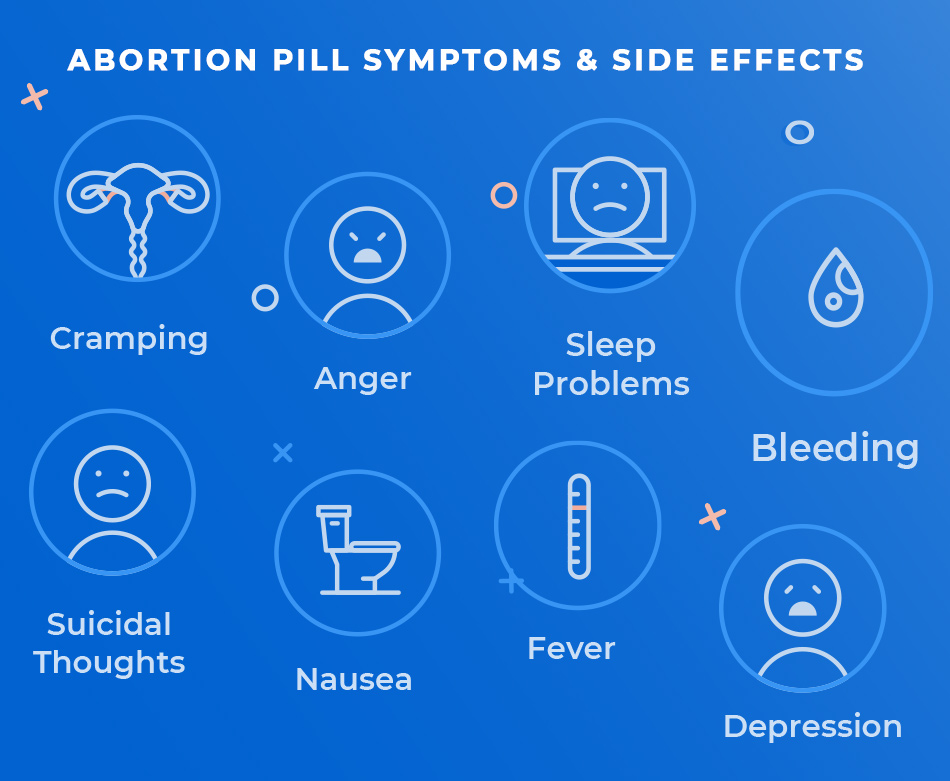
A Woman’s Choice does not perform or refer for abortion procedures. For specific information about our services, refer to the site above.
The abortion pill is the most common form of abortion for an early pregnancy. However, many women have questions about its safety and potential side effects.
Here at A Woman’s Choice, we want women to feel empowered to make positive choices for their future, and we believe the first step to confidence is knowledge. In this article, we’ll walk through everything you need to know about the symptoms and side effects many women experience with abortion pill. If you have questions or concerns you’d like to discuss with a caring advisor, please reach out to us!
The abortion pill is a combination of medications (mifepristone and misoprostol) that end a pregnancy first stopping its growth, and then expelling it from the uterus. It can be prescribed by a licensed doctor for women who are pregnant up to 10 weeks (70 days after the first day of your last menstrual period).

The second medication, misoprostol, is taken at home up to 48 hours later. This medication expels the pregnancy, so it causes more painful symptoms and has a higher risk of side effects and complications.
The level of pain from the abortion pill varies from woman to woman, but nearly everyone will experience heavy cramping and bleeding that starts 2 to 4 hours after taking misoprostol. The most intense pain and bleeding typically lasts for about 6-hours, but these other common side effects can last for 2 to 4 weeks after the abortion5:
First 48 hours: During the abortion, and in the first 48 hours, you can expect to bleed more heavily from the abortion pill than from a heavy period.
Weeks 1-2: For the following two weeks, bleeding is likely to continue but should never be more than a normal period.
Weeks 3-6: Bleeding or spotting from the abortion pill often continues for up to four weeks, followed by a normal period around week five or six.
Most of the abortion pill’s symptoms can be managed from home with prescription and over-the-counter medications (doctors usually prescribe anti-nausea and painkillers with the abortion pill). However, there are some less common side effects that signal a patient needs to see the doctor as soon as possible 6,7:
While physical side effects are relatively immediate, many women experience emotional and psychological effects that may appear later and last longer—everything from mild regret to more serious complications like depression.
According to the American Pregnancy Association, the most common negative feelings include:
In most cases, these negative feelings will subside as time passes. However, a previous history of mental health problems, or experiencing a sense of isolation may indicate a higher risk of depression.9
The abortion pill is sometimes advertised online, however, according to the FDA, the majority of those pills are not legal and might be ineffective, counterfeit, tainted, and unsafe.3,4
While some women prefer to take the abortion pill because they feel it will be more comfortable to have their abortion at home, the oversight of a doctor is still vital. A medical abortion is not an option for women who can not make follow-up visits to their doctor or don’t have access to emergency care.
The abortion pill is about 98% effective at ending a pregnancy, depending on how early it’s taken. The later in the pregnancy the abortion occurs, the more likely there is to be a complication or failed abortion.10
The rate of abortion-related ER visits following a medical abortion has risen dramatically in the last several years,11 so it’s important to be aware of the risks before making a decision about your health. Abortions should never be administered without medical supervision.
According to research, the greatest risks are:
The abortion pill is a big decision with lots of questions surrounding it, but it doesn’t have to be navigated alone. At A Woman’s Choice, we’d love to answer any question you have about abortion, pregnancy, and pretty much anything about your sexual health.
Chat with us anonymously online, book a free appointment that includes medical testing, or contact us just to talk privately about what you’re facing if you or a friend are pregnant.
A Woman’s Choice does not prescribe the abortion pill or refer for abortions. We are a non-profit community organization that is here to offer free education, medical testing, and support to women facing unplanned pregnancies. Learn more about our services here.
The abortion pill must be prescribed by a healthcare care professional who is licensed to distribute it. In prescribing the abortion pill, doctors must follow the abortion regulations of the state in which they are licensed.
In Florida, abortion is legal up until the 15th week of pregnancy, which includes the abortion pill up to 10 weeks of pregnancy. Women seeking the abortion pill will have to first visit a provider’s office to receive an ultrasound and counseling, and fulfill a 24-hour waiting period before the pill can be prescribed.(9) Click here for more information on Florida’s abortion requirements.
Plan B (also known as the morning after pill) is not the same as the abortion pill. Plan B is an over-the-counter form of emergency contraception that is designed to prevent pregnancy and will not end a pregnancy that has already been conceived. For more information on Plan B, click here.
the abortion pill is another name for the abortion pill, ru486. Plan B (also known as the morning after pill) is not the same as the abortion pill. Plan B is an over-the-counter form of emergency contraception that is designed to prevent pregnancy and will not end a pregnancy that has already been conceived. For more information on Plan B, click here.
Unlike Plan B, the abortion pill is not available over the counter and should only be administered by a licensed abortion provider.
The abortion pill may be taken up to 10 weeks of pregnancy, or 70 days after the first day of your last menstrual period. For pregnancies past 11 weeks gestation, a surgical procedure would be required for abortion.17

Our medical staff are licensed and will provide helpful, accurate information about your pregnancy.

Our team values your privacy. Your health information is 100% confidential and will never be shared with anyone.

A Woman’s Choice is here for you around the clock. Whether by phone, live chat, our 24-hour hotline, or sitting down face-to-face with you in our center, one of our team members is available to help you today.
(2) https://www.accessdata.fda.gov/
(4) https://www.goodrx.com/blog/what-you-need-to-know-abortion-pill-mifeprex-mifepristone/
(5) https://www.mayoclinic.org/tests-procedures/medical-abortion/about/pac-20394687
(6) https://www.healthline.com/health/abortion-pill#risks-and-complications
(7) https://www.mayoclinic.org/tests-procedures/medical-abortion/about/pac-20394687
(8) https://www.medicalnewstoday.com/articles/313098
(9) https://www.ncbi.nlm.nih.gov/pubmed/19698822
(10) https://www.ncbi.nlm.nih.gov/pmc/articles/PMC4554338/
(11) https://journals.sagepub.com/doi/full/10.1177/23333928211053965
(12) https://journals.sagepub.com/doi/full/10.1177/23333928211053965
(13), (14) https://www.fda.gov/media/112118/download; See also: https://www.ncbi.nlm.nih.gov/pmc/articles/PMC1188182/; and https://www.webmd.com/drugs/2/drug-20225/mifeprex-oral/details/list-sideeffects
(15) https://www.thecut.com/2018/11/how-much-does-an-abortion-cost.html
(16) https://journals.sagepub.com/doi/full/10.1177/23333928211053965

